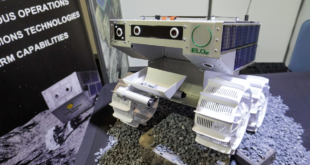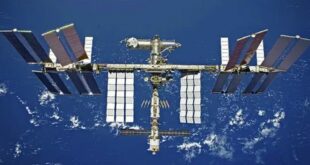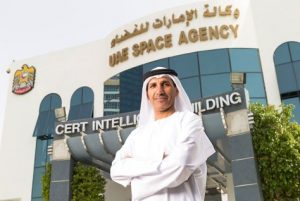
Clear Objectives for a New Space Pioneer
The UAE Space Agency has set out its stall right from the very beginning. It is highly ambitious, and since its establishment just four years ago, it has come an incredibly long way. It has overseen the initiation the Emirates Mars Mission (EMM) which will see probe to be launched to Mars in 2021. It has initiated an astronaut programme. It has introduced a graduate degree programme in Advanced Space Science. It is developing Mars Science City, which will be a prototype Mars settlement in Dubai. In short, the UAESA is taking its role in space extremely seriously and at the same time, is forging its own space industry and capabilities as well as a workforce to make it all a reality.
Through the EMM, and other space projects, the UAE is immersed in building valuable Emirati human capacity, technical skills, and all-important industrial know-how with the aim of becoming a regional leader in space technology, and a serious competitor in space exploration worldwide.
For the UAE, however, the capability to build and launch satellites and to nurture a space industry means so much more than the kudos that comes with it. A space industry represents diversification. At a time when the reliance upon petrodollars is no longer feasible, a new diversification strategy is called for. Space is one of the industries earmarked to take the place of the oil and gas sector along with the retail and real estate sectors. Economically, the space sector in the UAE is already an important driver. UAE’s investments in space technologies have already exceeded AED 20 billion (U.S.$5.4 billion), primarily supported by Emirati institutions and companies that include the Mohammed Bin Rashid Space Centre and Yahsat. There are some very exciting prospects on the table such as the establishment of a Space Port at Al Ain with partners including Virgin Galactic.
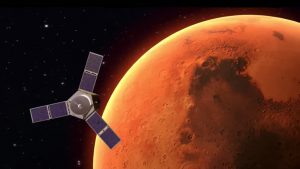
It is enormously ambitious, yet the UAE has the drive, determination, and investment to make space a success for the nation. The absolute dedication to the expansion of knowledge, the nurturing of a new generation of space scientists and engineers, and the fact that this is a country that knows it must diversify its economy, puts the UAE in a very strong position.
Torsten Kriening was able to sit down with Dr. Mohammed Al Ahbabi, Director General of the UAE Space Agency, and ask a few questions about the work that this dynamic country is doing in space.
Given all the inspiring and breathtaking initiatives in the UAE, can you give us an overview of their status?
The UAE space sector is growing rapidly, and some of this growth is down to a series of significant initiatives launched over the past few years.
Most recently, the UAE Astronaut Programme led by the Mohammed Bin Rashid Space Centre (MBRSC) generated significant interest. There were 4,000 applicants and 1,300 of them were women. This gives you an idea of how the public has been inspired and the extent to which people want to do something that is unusual in our region. I think this is a great signal for us.
The other notable relatively new project underway is Mars Science City, which will be the first prototype settlement to demonstrate what life could be like for the first visitors to Mars.
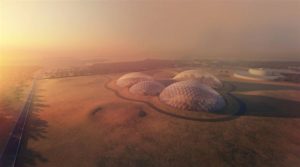
The Mohammed Bin Rashid Space Centre is also managing the Mars Science City project which will be built in Dubai over 2 million square feet. It is going to be a platform and a test bed that will replicate and emulate the environment on Mars. A lot of research will be conducted there. Part of it will be entertainment, part of it will be testing technologies. This is a great tool to facilitate research and development and innovation. We also believe that many solutions will spin off to solve our existing challenges in the region.
Our environment is in some ways similar to that of Mars. We lack water, food, energy and are facing climate challenges. We believe that in partnership with the international community, we can definitely use the things we discover through this project here on Earth. We hope the science and research will benefit everyone.
How big is your workforce at the moment in terms of the space sector in Dubai?
The entire space industry in the UAE is growing. I think, by now, we must number between 600 and 700 people. Every two years we conduct a survey of the sector in terms of manpower, investment and impact and we are conducting this now. By the end of the year we will have more accurate numbers but we are definitely growing.
You announced the National Space Regulation Law recently. Can you share more details on that?
The UAE Cabinet’s adoption of a new space law confirms the country’s intent to pursue its regional leadership in the space sector, as well as to compete on an international level.
The adoption of the law is a new achievement for the UAE’s national space sector. It is the first of its kind in the region and is in line with the vision of the wise leadership, as well as relevant federal policies and international conventions signed by the UAE.
The new law identifies the legal and legislative framework of the country’s space sector and will govern the activities of relevant authorities and companies when launching future national projects. This will ensure that they are operating according to unified standards, contributing to the international space exploration efforts, and maintaining the country’s position among the world’s leading countries in this sector.
The new law will provide guidelines for educational and academic authorities, as well as research and scientific institutions, to harmonise their curriculums to comply with the law and prepare future generations of Emirati engineers and specialists who are capable of promoting the country’s current capacities, in line with its overall aspirations.
The new law will have a key role in attracting more international companies to the UAE’s space sector, as well as create an environment that encourages investments and guarantees the future growth of these investments, which will have a positive impact on the sector’s development and strengthen the country’s overall research and scientific work
What is your vision for the next ten years for the UAE’s space sector?
Thanks to the continuous support and guidance of our nation’s visionary leaders I believe the future of the UAE’s space sector and numerous other sectors is bright and filled with opportunity. We have achieved an incredible amount since the Agency was founded in 2014 and I have no doubt that the following ten years will bring with them much excitement and success.
 SpaceWatch.Global An independent perspective on space
SpaceWatch.Global An independent perspective on space



